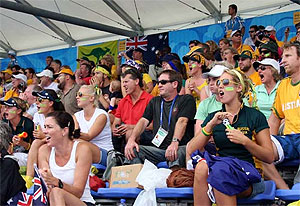
Channel 7 has set itself an admirable and heroic task of covering every Australian medal triumph at the Beijing Olympics. The network has thrown huge resources of staff and equipment to bring all the Australian moments of glory back to viewers across our vast continent.
This is great stuff for ratings, presumably.
It will also strike a chord with those partiotic supporters who think that the ‘Aussie, Aussie, Aussie, oi, oi, oi!’ chant is a true Olympic chant.
But for me, and I suspect the majority of Australians, the Australian Olympics are not the only Olympics story we want to see and experience.
We don’t just want a visual record of Australian gold, silver and bronze medals. We want the whole experience of the Olympics.
We want to see and feel through vivid pictures and insightful words the triumphs and the disasters of athletes from around the world. Not just those from Australia.
Up to Wednesday, for instance, fourteen countries had won gold medals. Australia with three gold medals, one silver and nine bronze was fifth on the list. China (eleven gold medals), United States (seven), South Korea (five) and Italy (three), all had a higher rank.
Among the other gold medal winners were North Korea and Azerbaijan, along with the usual suspects Japan, Russia, Great Britain, Germany, Czech Republic, Netherlands and Slovakia.
Where were the stories of at least some of these medalists on Channel 7’s seemingly endless broadcast schedule?
The story behind the result somehow seems to be beyond the reporting skills of the broadcaster.
The print media, for instance, raised the matter of synchronised cheering for the local team at the gymnastics. The commentary team did not make any reference to this, and the possibility (or likelihood) that the judging might be affected by blatant stacking of the spectators.
China won the men’s and women’s team events in the gymnastics for the first time.
Was it a coincidence that it was the first time, too, that the teams performed before a rabidly enthusiastic home crowd?
The Sydney Morning Herald reported on a judging controversy in the Olympic shooting event in which the Chinese competitor, Hu Binyuan, won bronze in the men’s double trap when “on a least on three occasions in the tense final stages, Hu was awarded a hit by Chinese judges despite clearly missing the target.”
I watched the so-called News Updates throughout the day after this story was published to see some footage to verify this disturbing story, or evidence that the reporter somehow got the story wrong.
You would think that this story goes to the heart of the credibility of the Beijing Olympics, and the integrity of the Olympic ideals in actual practice.
But instead the update items involved Tasmyn Lewis repeating comments made about the inevitability of competing against drug cheats, and so on.
Talking about suspect judging, I watched Stephen Sutherland, the youngest member of the Australian boxing team, get beaten 14 – 2 by the experienced Tunisian, Walid Cherif.
Sutherland’s two points came at the end of the fight.
I must say that throughout the fight, I was amazed at the way the Tunisian was given points for punches that did not land cleanly, while Sutherland was not given points for his clean punches.
The Sydney Morning Herald reported that whenever the Tunisian launched a punch, whether it landed cleanly or not, his supporters cried out to influence the judges.
The British commentators noticed the discrepancy in the way points were awarded, but I haven’t seen a follow-up story with evidence from the tapes of the fight, for or against, the judging.
And where was the detailed story on the News Update of the scandal, headlined in The Times, as: “China banned child singer with crooked teeth from singing at the opening ceremony.”
It was not on the main updates on Wednesday that I watched.
The Times Online have reported from Chaoyang Park, the Beach Volley Ball Ground, that during the women’s tournament 300 “fans” (The Times’ parenthesis) formed a cheer squad that was directed by two ladies instructing it to wave and shout out.
The Olympic spirit in play? I don’t think so.
What’s going on here?
My guess, although it is only a guess, is that Channel 7 is going out of its way to avoid embarrassing the host city and the Chinese officials it depends on for a thousand or more concessions to get its pictures and words through.
Also, despite the vast number of journalists and producers in the Channel 7 team, the organisation with its Sunrise-style of reporting just does not have the true journalistic culture that demands that stories are run and to hell with the consequences.
The IOC has already proclaimed these Olympics as “the best-run ever.” But I think one of the real stories of the Beijing Olympics that is emerging is the extent to which the Chinese authorities have gone beyond the bounds of fair play that is supposed to be an integral part of the Olympic spirit to ensure a huge haul of medals for their athletes and teams.
This is a story that is not being covered on television for Australian viewers.
Finally, here’s another coincidence that the Channel 7 might care to follow up.
The Australian men’s rowing eight was the only team to allow Chinese officials to examine the rudder of its boat for algae. Rudders never break down.
But as Kevin Rudd might say, “guess what?”
The rudder on the Australian boat became inoperable in the crew’s first heat, forcing the team to qualify for the final the hard way.
—
Photo by Elizabeth Chapman in Beijing





























































































